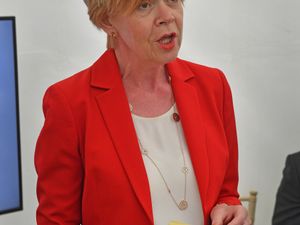Babcock slips to a pre-tax annual loss
Engineering giant Babcock, which has operations in the Black Country and Shropshire, slipped to a pre-tax loss in the year to the end of March.
The group's revenue was statutory revenue was down from £4.47 billion in the previous year to £4.44bn with the loss of £178.2 million comparing to a £235.2m profit a year before.
Babcock, including the Defence Support Group operation at MoD Donnington, Telford, and Babcock Vehicle Engineering – the former Macneillie specialist vehicle conversions business – at Aldridge, has a record combined order book and pipeline of around £35 billion up from £31 million in March last year.
Chief executive Archie Bethel said: "We end a busy year in a strong position to deal with the current coronavirus uncertainty. We saw strong performances across our marine, nuclear and land sectors and have taken action to address weaknesses in aviation, including writing down goodwill to reflect our updated expectations of the oil and gas market. The early impact of the global Covid-19 pandemic had a limited impact on the group in the last financial year but is creating uncertainty as we head into this new financial year.
"I am immensely proud of the way our people have responded in these challenging times. At Babcock we pride ourselves on the fact that we support customers responsible for providing critical services: our work in defence and aerial emergency services saves lives, supports national defence and protects communities. As always, my priority, and the priority of the group, is to keep our people safe whilst making sure that those vital services can continue."
Mr Bethel said he was also extremely grateful tothe Government and in particular the Cabinet Office and Ministry of Defence who acted quickly and decisively to ensure that contracts continue to be funded and that cash flowed effectively through the main suppliers and down into the supply chain.
The majority of Babcock's work was declared to be critical and the workforce was designated as key workers.
All major sites have remained open through the lockdown and Babcock has continued to work on major defence programmes, design new systems, to provide emergency services and to keep nuclear power sites operational.
Mr Bethel said the group had contributed to the fight against the pandemic with new innovative technical solutions including the introduction of biocontainment isolation stretcher units which allow virus positive patients to be transported safely and new in-helicopter barrier systems that provide added protection to flight crews and medical staff.
He added that in the last year it had made solid progress in driving its strategy forward and achieved good revenue growth across defence businesses and won significant opportunities, including building the next generation of UK warships, securing long term positions on major submarine projects for the United States and Australia and expanding aviation defence operations in France.
Babcock's area of weakness was in the oil and gas aviation business where it has written down the value of assets in that business to reflect this.
"Despite this uncertainty, the group's strong liquidity position, robust business model, record order book and pipeline and focus on critical services gives us confidence that we will deliver for all our stakeholders in the current year," said Mr Bethel.
The 2019-2020 profit figures were affected by exceptional items of £503 million include aviation goodwill impairment of £395 million and other aviation charges of £143 million including the oil and gas write downs.
Babcock has today completed the sale of its share of the Holdfast joint venture for £85m.
Given the current level of uncertainty Babcock is not providing financial guidance for the current financial year and will provide a further update on trading ahead of its annual general meeting on August 4.




